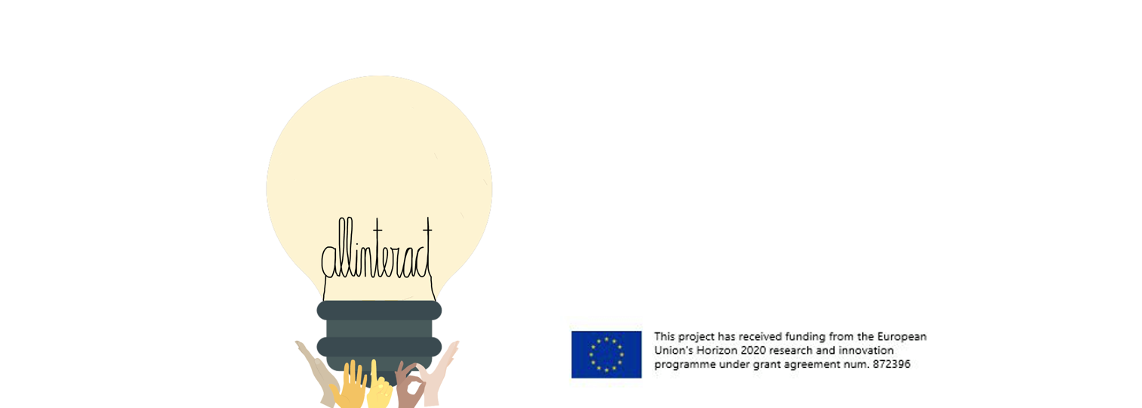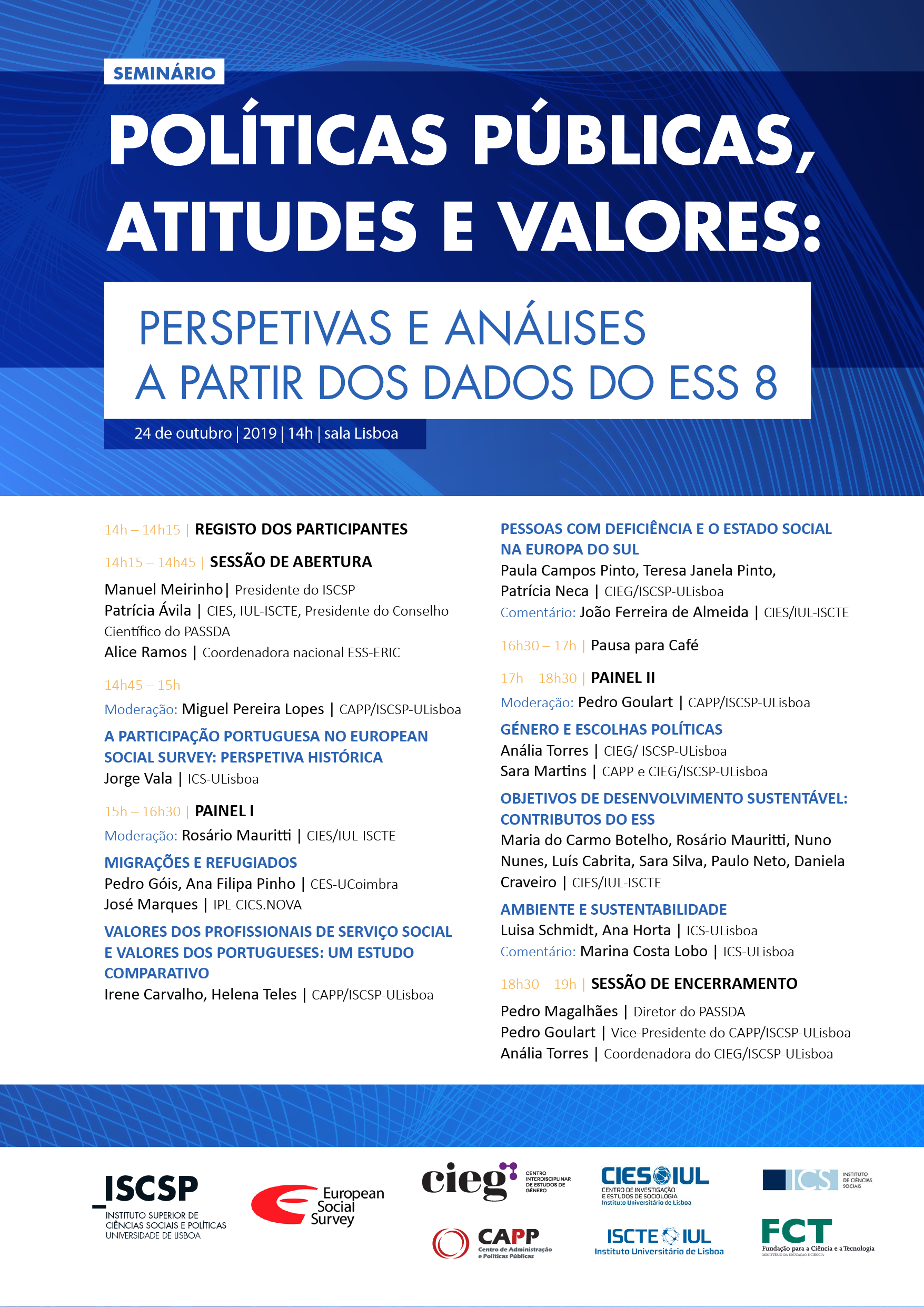Gender in Debate session, 10 December 2019. The session featured invited speakers Maria José Magalhães (FPCEUP/CIEG) and Maria Helena Esteves (IGOT-ULisbon), with moderation of Maria João Cunha (CIEG).
Gender in Debate session, 8 May 2019. The session featured invited speakers Sofia Marinho, Researcher at ICS-ULisbon, member of the OFAP and of the research group LIFE; Teresa Féria, President of the Portuguese Association of Jurist Women and Judge of the High Court; and Anália Torres, CIEG’s Coordinator. The moderator of the debate was the Journalist Paula Cosme Pinto.
Gender in Debate session, 4 April 2018. The session featured invited speakers Catarina Marcelino (former Secretary of State for Citizenship and Equality, deputy and activist) and Lígia Amâncio (Full Professor of Social and Organizational Psychology at ISCTE-IUL and SAGE – Systemic Action for Gender Equality Project Coordinator). The moderator of the debate was Eduarda Ferreira (researcher at CICS.NOVA, feminist and LGBT rights activist).
Webinar GE-HEI – Gender Equality in Higher Education Institutions, hosted by CIEG/ISCSP-ULisbon, took place on 16, 17 and 19 November 2020.
The Opening Session featured João Sobrinho Teixeira (Secretary of State of Science, Technology and Higher Education), Ricardo Ramos Pinto (President of ISCSP-ULisbon), Ângela Noiva (DGES) and Anália Torres (Coordinator of the Project and CIEG’s Coordinator).

CIEG is partner in the research project “ALLINTERACT: Widening and Diversifying Citizen Engagement in Science”, awarded with a H2020 grant. The general goal of the project is twofold: on the one hand, to create new knowledge about how to transform potential citizen participation in science into actual engagement in scientific research. On the other hand, to unveil new ways to engage societal actors, including young citizens and groups that have traditionally been excluded from science.
The consortium is coordinated by the University of Barcelona (Spain) in partnership with the University of Helsinki (Finland), Rijksuniversiteit Groningen (Netherlands), Universita’Degli Studi di Milano-Bicocca (Italy), Institute of Political and Social Sciences of the University of Lisbon (Portugal), the Chancellor, masters and scholars of the University of Oxford (United Kingdom) and the European Parents Association (Belgium).
FACEBOOK: https://www.facebook.com/allinteract/ (@allinteract)
TWITTER: https://twitter.com/allinteract (@allinteract)
INSTAGRAM: https://www.instagram.com/allinteract/?hl=en (@allinteract)

Violence against women tended to increase during the COVID-19 pandemic, according to international reports and scientific articles, but we do not yet have data to demonstrate it. The Committee's statement on the Istanbul Convention is a benchmark for analyzing the measures of the local Public Administration and the actions of the organized entities to prevent gender and / or domestic violence, identifying innovative and transferable tools developed in this period in Portugal.
The V International Congress Architecture and Gender | ACTION. Feminisms and the spatialization of resistances is the continuity of reflections organized since 2015 and mainly from southern Europe, enabling the construction of networks, research and transcontinental experiences. In this genealogy, with varied programs and themes, the previous congresses are ArquitectAs (2014, Seville), Matrices (2015, Lisbon), MORE(2017, Florence), and Fielding Architecture (2019, Brighton). The fifth edition emphasizes the political component of space and rights intersection, never forgetting the diversity of being a woman or a girl and the crossing with the current circumstances derived from the COVID-19 pandemic.
In 1995, the Beijing Declaration and Platform for Action, adopted at IV World Conference on Women, was an essential event in the fixation of a political, strategic and global agenda, related to women’s rights and opportunities. Today, twenty-five years later, we witness the coexistence of public practices and progressist policies in parallel with severe losses and silences. To reflect, discuss and propose, critical and collectively, theories, strategies and practices, become urgent. Through an expanded and interdisciplinary stance, we call for a focus on resistances, anchored by intersectional feminisms – necessarily post-colonial and decolonial –, and women and non-normative people’s rights, revindications, wishes and aspirations.
Throughout the world, in diverse socio-cultural and professional spheres, several struggles against patriarchy, racism and capitalism are organized collectively. From bodies to global territories, in local and transnational contexts, space strands’ understanding and action are fundamental answers to discriminations, marginalization and absence of rights. Starting from resistance dynamics in the production and appropriation of territories, cities, architectures and objects, we are especially looking for contributions placed as purposive actions in the spatialization of rights. In the context of the recent COVID-19 pandemic, emphasis will also be placed on critical and situated reflections on, on the one hand, the affect and alteration of women’s lives in the private and public spheres, and, on the other hand, what are the possibilities for territories we inhabit.
Among others, this congress intends to discuss and act, in a critical reflection framework, on the following topics:
Submission of original proposals must be done by EasyChair platform until November 15, 2020. The abstract should have 300 words as maximum, until 5 bibliographic references (APA format) and include the intended topic. Each person may submit at most one individual abstract and one in co-authorship, or two in co-authorship. The working languages of the congress are Portuguese, Spanish and English.
The publication of articles, validated for this purpose in a posterior blind peer review, is planned, in paper or online format.
Due to pandemic circumstances, the congress will take place in an online format.
Call: https://easychair.org/cfp/5CIAG
Submission of papers: https://easychair.org/conferences/?conf=5ciag
Irá realizar-se no próximo dia 24 de outubro, a partir das 14h, na sala Lisboa do ISCSP-ULisboa, o seminário ‘Políticas públicas, atitudes e valores. Perspetivas e análises a partir dos dados do ESS 8’.
O European Social Survey (ESS) é um inquérito internacional que recolhe informação comparativa transnacional sobre atitudes e comportamentos, particularmente adequada para as Ciências Sociais e Políticas. Portugal tem participado na sua realização desde o início do projeto em 2002.
Esta sessão pretende dar a conhecer as múltiplas aplicações desta base de dados, a mais importante com perspectiva comparativa Europeia e de acesso gratuito que, dada a sua abrangência, permite análise mais ricas e com maior potencial de publicação.
Informações sobre o programa podem ser encontradas no cartaz do evento.

News/ Events
CIEG's activities